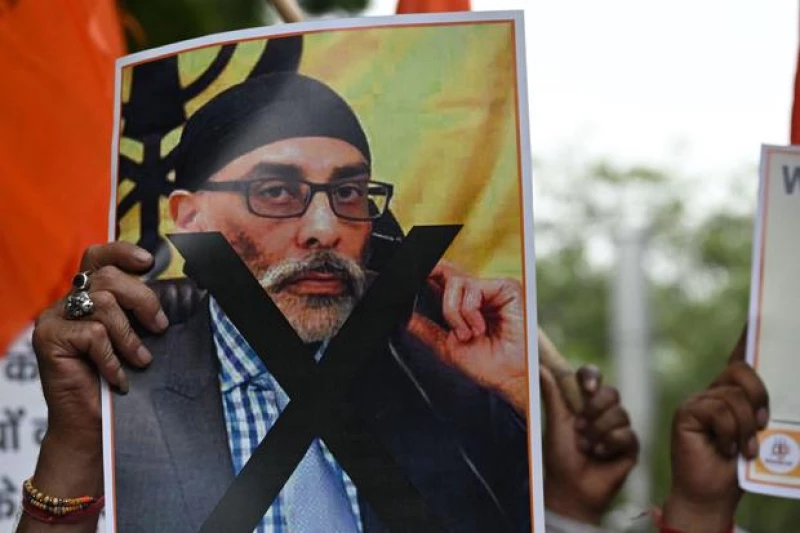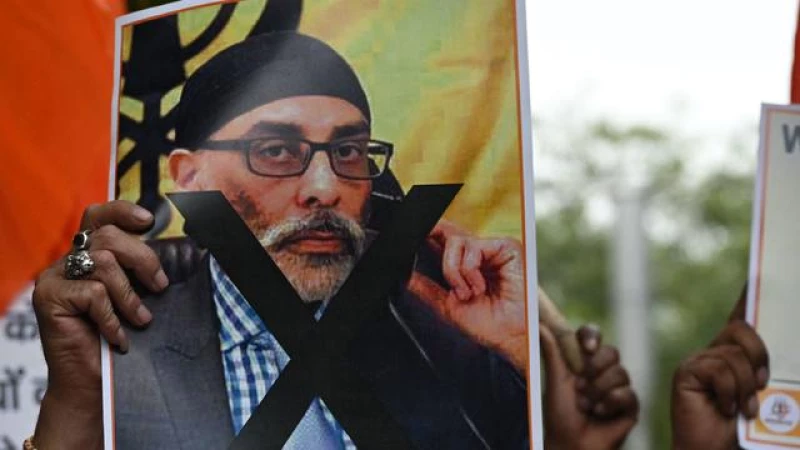Alleged Plot to Assassinate Sikh Separatist Leader on U.S. Soil
New Delhi — U.S. officials have engaged in discussions with Indian counterparts regarding suspicions that India may have been involved in a scheme to assassinate a Sikh separatist leader on American territory, according to a statement from the U.S. National Security Council on Wednesday.
The target of the plot was Gurpatwant Singh Pannun, a dual national of the United States and Canada, who has been designated as a terrorist by the Indian government, as reported by the Financial Times.
The Financial Times, citing anonymous sources, stated that the murder conspiracy was foiled by U.S. authorities, who subsequently issued a warning to the Indian government regarding their alleged involvement in the plot.
The U.S. National Security Council, in a statement provided to CBS News on Wednesday, emphasized that they are treating the matter "with utmost seriousness."

Gurpatwant Singh Pannun and the Khalistan movement
Pannun, a former resident of India's Sikh Punjab province, is the leader of Sikhs for Justice, an organization based in New York. Established in 2007, Sikhs for Justice advocates for the creation of an independent Sikh state called Khalistan.
In 2019, the Indian government banned Pannun's organization for engaging in "anti-India activities" and labeled him a terrorist. Recently, the National Investigation Agency (NIA), India's top counterterrorism agency, filed a new case against Pannun for his social media posts urging Sikhs to boycott Air India. Pannun warned that people's lives could be at risk if they chose to fly with the national carrier, although he did not provide specific reasons.
The Financial Times report on the alleged murder plot involving Pannun stated that it is unclear whether the U.S. government's protest to India prompted the plotters to abandon their plan or if U.S. law enforcement intervened to thwart the plot.
The Indian government acknowledged in a Wednesday statement that U.S. officials had "shared some inputs" about common security concerns, which it said it was taking seriously.
"During the course of recent discussions on India-U.S. security cooperation, the U.S. side shared some inputs pertaining to nexus between organized criminals, gun runners, terrorists and others. The inputs are a cause of concern for both countries and they decided to take necessary follow up action," Arindam Bagchi, a spokesperson for India's foreign affairs ministry, said in the statement.
"India takes such inputs seriously since it impinges on our own national security interests as well," he added.
The murder of Hardeep Singh Nijjar in Canada
The alleged plot against Pannun came to light just two months after Prime Minister Justin Trudeau said there was "credible" evidence of an Indian government role in the murder of another Sikh separatist leader in Canada. India has firmly denied any role in the killing.
Hardeep Singh Nijjar was fatally shot by unidentified gunmen in Surrey, British Columbia, on June 18, and Trudeau's allegation of Indian involvement led to a major diplomatic row between the two nations.
The Biden administration expressed its deep concerns over the allegations made by Trudeau regarding India's involvement in the killing. Secretary of State Antony Blinken emphasized the importance of the Canadian investigation and urged India to cooperate in the probe.
In July, the Sikh leader Pannun, who had a 20-year relationship with Nijjar and considered him like a younger brother, stated that he would seek revenge for his death. Pannun made these remarks in an interview with the Times of India.







